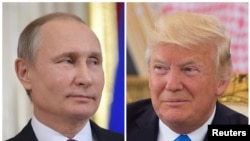U.S. intelligence agencies got it right when they concluded Russia meddled in the 2016 U.S. presidential election, ultimately, with the goal of helping then-candidate Donald Trump, according to a just-released report by U.S. lawmakers.
The report Tuesday, by the Republican-led Senate Intelligence Committee, is the fourth volume to be published as a result of the committee’s investigation into Russia and focused on the assessment made by the top U.S. intelligence agencies following the 2016 vote.
“The Committee found no reason to dispute the Intelligence Community’s conclusions," Intelligence Committee Chairman Sen. Richard Burr said in a statement.
The report comes at what some current and former U.S. officials see as a critical time for the intelligence community, which has been without a permanent leader since former Director of National Intelligence Dan Coats stepped down last September.
And this past February, U.S. President Donald Trump forced out then-Acting Director of National Intelligence Joseph Maguire, following reports a top aide warned lawmakers during a classified briefing of renewed Russian attempts to meddle in the upcoming presidential election in November.
Backing up intel community’s assessment
Yet despite the Trump administration’s ongoing distrust of the U.S. intelligence agencies, U.S. lawmakers found no reason to doubt their work on Russian meddling four years ago.
“The Committee finds the conclusions of the ICA (Intelligence Community Assessment) are sound and is reassured by the fact that collection and analysis subsequent to the ICA's publication continue to reinforce its assessments,” the report stated.
U.S. lawmakers said they relied on 25 interviews and hearings with more than 40 of the intelligence officers who were involved in crafting the January 2017 ICA on Russian’s interference in the 2016 election, a version of which was released to the public.
The January 2017 unclassified assessment by the Central Intelligence Agency, the Federal Bureau of Investigation, and the National Security Agency concluded Russia aimed to "undermine public faith in the U.S. democratic process" as part of a plot approved and directed by Russian President Vladimir Putin.
"We further assess Putin and the Russian government developed a clear preference for President-elect Trump," the intelligence agencies wrote at the time, adding, "Putin and the Russian government aspired to help President-elect Trump's election chances when possible."
Trump’s rejection of Russian meddling
Since taking office, President Trump has consistently rejected the conclusions, repeatedly dismissing those and similar allegations that the Kremlin sought to get him elected as a hoax.
Some of Trump’s most pointed criticism has been reserved for former top U.S. officials, including fired FBI Director James Comey, former National Intelligence Director James Clapper and former CIA Director John Brennan, whom he described as “political hacks.”
He has also cited Putin’s own denials of the allegations.
"He said he didn't meddle," Trump told reporters following a conversation with Putin in Vietnam in 2017. "He said he didn't meddle. I asked him again. You can only ask so many times."
"President Putin says it's not Russia,” Trump added during a joint news conference during their July 2018 summit in Helsinki. “I don't see any reason why it would be."
Still, the Senate Intelligence Committee analysis found the work done by the U.S. intelligence community on Russian interference was sound.
The 2017 intelligence assessment “reflects proper analytic tradecraft despite being tasked and completed within a compressed timeframe," lawmakers concluded. “Analysts were under no politically motivated pressure to reach specific conclusions.”
Steele dossier
Committee lawmakers also downplayed concerns about the intelligence community’s use of a controversial dossier often cited by Trump supporters as evidence the FBI unfairly targeted members of his campaign.
The dossier, compiled by former British spy Christopher Steele, was paid for by Democratic party members seeking to elect Trump’s 2016 opponent, former Secretary of State Hillary Clinton.
Information included in the footnotes of a recently declassified Justice Department report indicate the dossier may have contained Russian disinformation.
But the Senate Intelligence report said the dossier, while included in an annex to the 2017 intelligence assessment, was viewed with skepticism.
“Information provided by Christopher Steele to the FBI was not used in the body of the ICA or to support any of its analytic judgment,” it said. “It was unverified information and had not been disseminated as serialized intelligence reporting."
The Senate report is not the first to support the intelligence community’s conclusions on Russian interference in the 2016 election.
A 2018 report by the same committee found the intelligence work to be “sound.”
An investigation by Special Counsel Robert Mueller, which Trump labeled as a “witch hunt,” likewise concluded last April that while there was no evidence to establish any coordination between the Kremlin and members of the Trump campaign, “the Russian government perceived it would benefit from a Trump presidency and worked to secure that outcome.”
Still, some Trump supporters said Tuesday that the new Senate report continues to overlook concerns about the intelligence community’s process.
“This report reads like a whitewash,” Fred Fleitz, a former CIA analyst who now heads the Center for Security Policy, said on Twitter.
“I'm told there were CIA dissenters who were subjected to political pressure,” he added.





